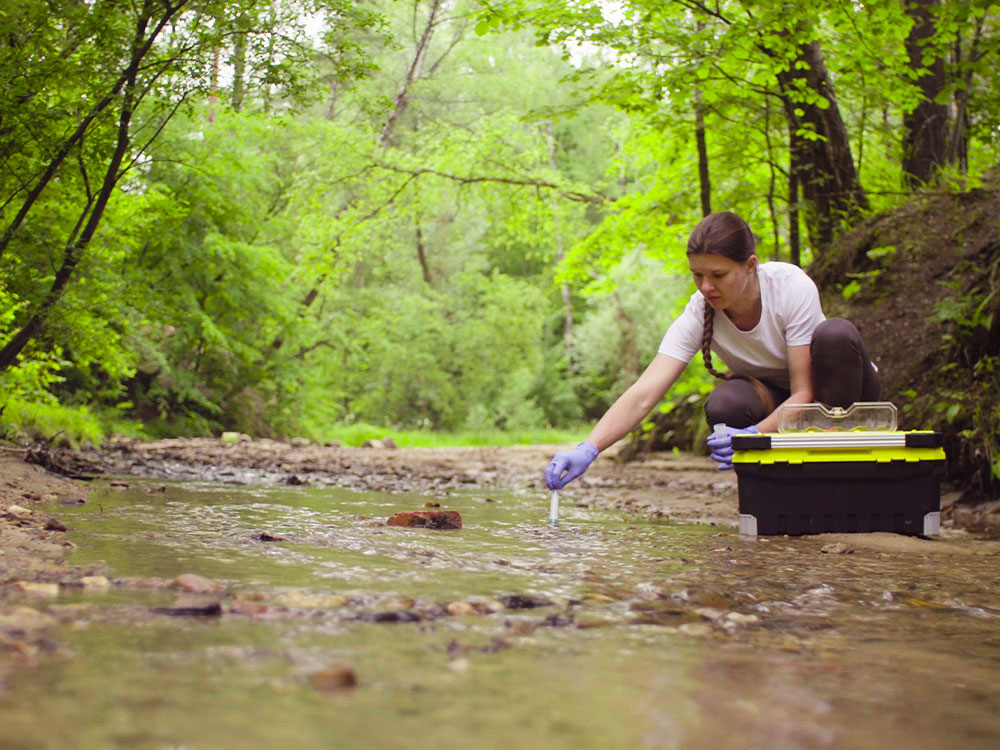
Why Pursue a Master's Degree in Environmental Science
The Master of Science Degree in Environmental Science consists of four primary research areas:
- Aquatic Science
- Conservation and Restoration Ecology
- Natural Resources and Wildlife Management
- Plant Biology
Graduates from the program are employed in diverse careers, including in local and federal government agencies, non-governmental organizations, industry, and academia. Graduates who complete a thesis are also highly competitive for top doctoral programs across the country.
Thesis Option
The thesis option is recommended for students who are planning a career in environmental education, research, or who plan to go on and earn a doctorate degree. The purpose of the thesis track is to gain experience and competency in a research topic by following the scientific process that culminates in a written thesis suitable for peer-reviewed publication.
Non-Thesis Option
A professional (non-thesis) option is also available for those interested in developing skills and knowledge to assume professional research and/or managerial positions within public, private, and nonprofit organizations. The program is designed to develop skills in data analysis, oral and written communication, and interdisciplinary teamwork. The non-thesis track provides exposure to a wide range of areas of environmental science and ecology through a coursework-focused curriculum.

Current Research
The Master of Science in Environmental Science Program is multidisciplinary and draws on faculty from many departments, including Integrative Biology, Chemistry, Civil and Environmental Engineering, & Construction management, and Earth and Planetary Sciences. Recently completed thesis projects include:
- Andrew Baldwin (2012): The effects of repetitive grazing on schizachyrium scoparium and the role it plays in woody plants encroachment on Texas grasslands.
- Claudia Contreras (2011): Transcriptional analysis of distant signaling induce by insect elicitor and mechanical wounding in zea mays.
- Jeremy Shields (2011): The effects of different sources of supplemental carbon on the growth rate of neochloris oleoabundans.
Admission & Application Requirements
Applications are submitted through the UTSA Graduate Application. Please upload all required documents (listed below) on your UTSA Graduate Application. It is the applicant’s responsibility to ensure completion and submission of the application, a nonrefundable application fee, and all required supporting documents are on file with UTSA by the appropriate application deadline.
| Environmental Science (MS) | ||
|---|---|---|
| Required Degree | Bachelor's Degree from an accredited college or university in the United States or have proof of equivalent training at a foreign institution. | |
| Minimum GPA | 3.0 (on a 4.0 scale) Departments may consider GPA of last 60 semester credit hours | |
| Coursework | 18 credit hours in an area related to this graduate degree and at least 12 hours must be at the upper-division level. | |
| Transcripts* | Required from all institutions attended; international transcripts must be recorded/translated to English | |
| Credential Evaluation | Required if you have earned university-level credit from foreign institutions. Submit an evaluation of your transcripts from Educational Credential Evaluators (ECE) directly from the graduate admission application platform | |
| English Language Proficiency | 550 TOEFL Paper / 79 TOEFL Internet / 6.5 IELTS / Duolingo 100 | |
| Purpose Statement | Required | |
| Resume | Required | |
| Letters of Recommendation | 2 academic or professional reference(s) demonstrating your attributes for successful completion of this program (you will request these through the Graduate Admissions Application; let your recommenders know of your deadline to ensure submissions are on time) | |
| *Unofficial transcripts will be taken into consideration for admissions; however, if admitted into the program, you must submit official transcripts to the University. | ||
Application Deadlines
Applicants are encouraged to have their admission file completed as early as possible. All applications, required documents and letters of recommendation, if applicable, must be submitted by 5:00 PM U.S. Central Time on the day of the deadline. Deadlines are subject to change.
| Environmental Science (MS) | |||
|---|---|---|---|
| Timing on Admission Decision: Completed applications will be reviewed for admission on a rolling basis. Decisions generally will be made and sent to applicants within 4 to 6 weeks of receiving the application. | |||
| Application Deadlines for: | Priority | International | Domestic |
| Fall 2024 | March 1 | June 1 | June 1 |
| Spring 2025 | Not Available | October 1 | October 1 |
| Summer 2025 | Not Available | Not Available | Not Available |
Funding Opportunities
A limited number of teaching assistantships are available to qualified applicants on a competitive basis. Contact the Graduate Advisor of Record for more information.
For information about department scholarships, click below.
Learn moreCareer Options
UTSA prepares you for future careers that are in demand. The possible careers below is data pulled by a third-party tool called Emsi, which pulls information from sources like the U.S. Bureau of Labor Statistics, U.S. Census Bureau, online job postings, other government databases and more to give you regional and national career outlook related to this academic program.
Courses are offered mostly in the late afternoon and evening.


